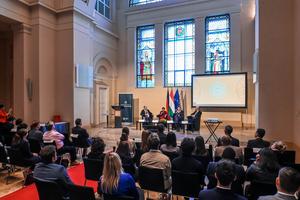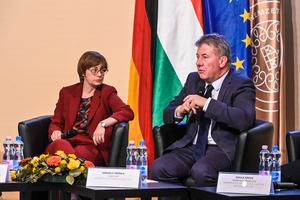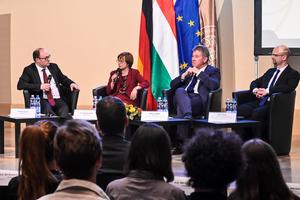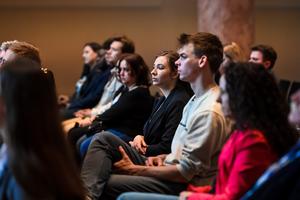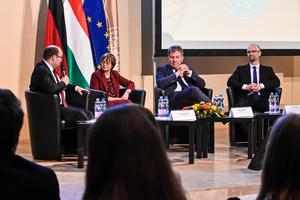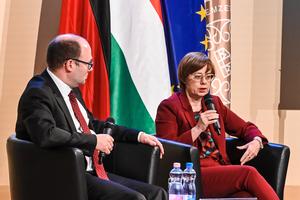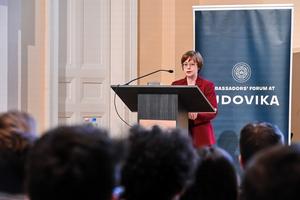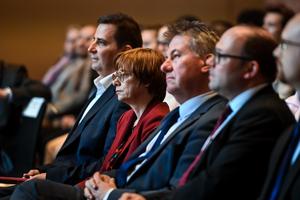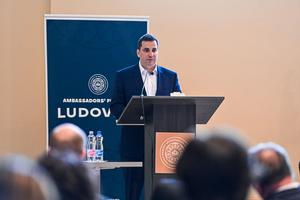As per tradition, the Ludovika Ambassador's Forum was held on 17 May at the St. Ladislaus Chapel of the University of Public Service. This time H.E. Ms Julia Gross, Ambassador Extraordinary and Plenipotentiary of the Federal Republic of Germany to Hungary, was invited to give a keynote speech entitled Unity of Europe and participate in a round-table discussion. The event was moderated by Dr Bence Bauer, director of the German-Hungarian Institute for European Cooperation. The panellists were Gergely Prőhle, former Ambassador and director of the Institute for Strategic Studies and Gyula Speck, assistant lecturer at UPS and expert on the changes in Germany's foreign and security policy after 2014, with a particular focus on arms exports and defence-related issues.
The event was opened by Dr Gergely Deli, rector of Ludovika-University of Public Service. In his opening speech, Rector Deli highlighted the fact that Germany is the centre of the EU and its economy’s engine: “Germany is the engine of the European economy and the driving force of policy-making in the European Union. Brexit has further enhanced this role of power in the EU as a whole”. The cultural and ideological trends in the EU are also set primarily by German politics. Nowadays, the EU is being hit by a series of crises. Hence this engine needs special attention to work flawlessly: “The epidemic and its effects are still with us; we are witnessing a bloody war raging in our neighbourhood, an extraordinary military and geopolitical conflict that is affecting the whole world”. Via the event, Ludovika-UPS aims to provide a forum where the participants can discuss these kinds of modern challenges, all this while giving students the extraordinary opportunity to hear first-hand experiences from professionals working in diplomacy and international relations.
H.E. Julia Gross started her speech by explaining that the EU, as an entity, is the framework of our cooperation. Its circumstances are immensely atypical in the sense that it finds a balance between national sovereignty and unity between member states. Her Excellency highlighted the EU’s “unity is not a synonym for uniformity”. The organisation’s objective was never to annul cultural differences between its peoples but to achieve peace and stability by building on joint strength and resilience. Ambassador Gross noted that the last few years had seen an unprecedented shift in the geopolitical landscape due to new threats such as the pandemic of 2019 and the Russo-Ukrainian war. She continued her speech with other crucial points explaining the possibilities of the EU in the future, the relationship between NATO and the EU, and the bilateral relations between Germany and Hungary. She expressed her sincere concern regarding the two nations’ relationship and possible rifts overshadowed by differences. Nevertheless, German foreign policy always focuses on EU interests, and according to Her Excellency, maintaining a good relationship between Hungary and Germany is more paramount than ever.
After Ms Ambassador’s speech, a roundtable discussion allowed the audience to deepen the analysis of the subjects mentioned. The moderator, Dr Bauer, steered the conversation by asking questions – among others - about the German Chancellor, Olaf Scholz’s plans regarding Europe, or Germany’s new Feminist Foreign Policy which anchors gender equality in different areas. This latter seemed to be a stirring topic, as it was reflected during the regular Q&A session when the audience also had the opportunity to ask further questions to the guests.
Text: International Office
Photo: Dénes Szilágyi
